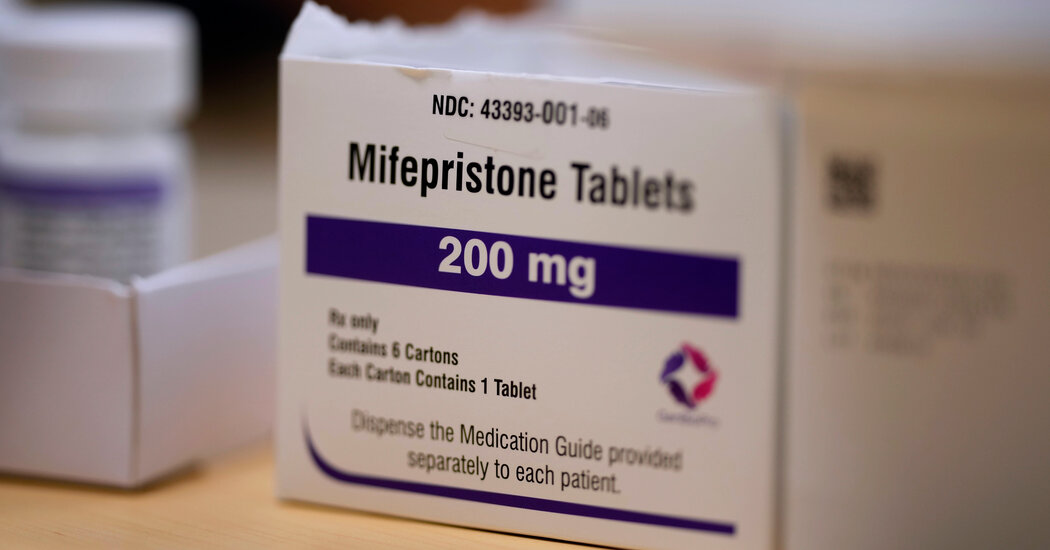The country’s largest manufacturer of abortion pills is wading into the first major legal battle over abortion of President Trump’s second term.
The company, GenBioPro, on Tuesday asked a Texas court to add it to the list of defendants in a lawsuit filed in October by three Republican state attorneys general. The move was a significant offensive action on an issue seen as a vanguard in the fight over access to abortion.
The lawsuit was filed by the state attorneys general from Missouri, Idaho and Kansas, and asks a federal court to reverse a series of Food and Drug Administration regulations that have greatly expanded access to the abortion pill mifepristone.
Under the Biden administration, the Justice Department defended the agency’s rules and F.D.A.’s approval of the medication 25 years ago. But many abortion rights advocates anticipate that the Trump administration will decline to defend the agency, effectively siding with the state attorneys general and using the case to limit access.
If the judge grants GenBioPro’s request, the maneuver will allow the company to lead the defense of mifepristone. The company is being represented by Democracy Forward, a legal nonprofit that has filed more than a dozen lawsuits and won multiple court orders against the Trump administration.
“The foundation of these extreme politicians’ arguments are purely political, rather than based in scientific evidence,” said Skye Perryman, the president and chief executive of Democracy Forward. “The threat this case brings to abortion access nationwide cannot be understated.”
Abortion pills are prescribed up to 12 weeks into pregnancy and are used in nearly two-thirds of abortions in the United States. In states where abortion is criminalized or heavily restricted, mail-order medication has become the central way to receive the procedure.
Since the Supreme Court eliminated the constitutional right to abortion in the 2022 case of Dobbs v. Jackson Women’s Health Organization, health care providers in states where abortion is legal say they have sent more than 10,000 abortion pills per month to patients in those states.
Abortion opponents have asked the administration to roll back rules that allow the pills to be prescribed by telehealth appointments and sent through the mail. They argue that in-person medical visits are necessary to safeguard patients. Such efforts are part of their mission to end all abortions. More than 100 scientific studies, conducted over decades, have found the pills to be safe and to rarely cause serious complications.
GenBioPro, which manufactures only abortion medication, controls roughly two-thirds of the market for the drug. The only other mifepristone manufacturer in the country, Danco Laboratories, is already named as a defendant in the suit.
“We remain concerned about extremists and special interests’ attempts to undermine the U.S. Food and Drug Administration’s regulatory authority,” said Evan Masingill, the chief executive of GenBioPro. “All people have a right to access safe, affordable, evidence-based health care, and GenBioPro remains committed to using all legal and regulatory tools to protect mifepristone for millions of patients and providers across the country.”
Whether Mr. Trump will take action to restrict the pills remains unclear. During his presidential campaign last year, he promised to leave abortion regulation to individual states. After winning the White House, Mr. Trump said it was “unlikely, very unlikely” that he would authorize additional steps to limit access to the abortion pill. But he refused to rule out the idea completely, telling an interviewer that people “feel strongly both ways.” He faces intense public and private pressure from the anti-abortion wing of his party to criminalize the medication.
Senator Josh Hawley, Republican of Missouri, said he specifically asked Mr. Trump in a private conversation to reinstate rules that require patients to pick up abortion medication in person. The move would severely curtail access for women in states with abortion bans.
“Those requirements were never controversial until Joe Biden decided that this was a good way to get around Dobbs,” said Mr. Hawley in an interview last month. “It’s an easy call to put the in-person dispensing requirement back in place, and I hope that the administration will do that.”
The legal fight over the pill began just months after the Dobbs ruling, when a coalition of anti-abortion rights organizations and doctors asked a Texas court to invalidate the F.D.A.’s approval of the pill in 2000.
The Supreme Court eventually rejected their argument, saying that the groups lacked legal standing to sue because they could not show evidence of being harmed by the pills.
The latest lawsuit is a revised and expanded version of that case. It directly challenges GenBioPro’s approval for generic mifepristone, which was granted in 2019, and takes aim at a wider range of rules intended to expand access to the pills.
The lawsuit asks the court to outlaw the medication for anyone under 18, reinstate the in-person appointment requirement, mandate that only doctors can prescribe the pills and limit the ability of retail pharmacies, like CVS and Walgreens, to dispense the medication.
The complaint also criticizes shield laws, which have been passed in eight states, that protect doctors and other health providers who prescribe and send abortion pills to patients in states with bans or restrictions. Lawsuits brought by conservatives in Louisiana and Texas are challenging the protections offered by such laws.
Rather than file the case in one of their home states, the state attorneys general brought it before Judge Matthew J. Kacsmaryk, of the U.S. District Court for the Northern District of Texas, a Trump appointee who opposes abortion access and who heard the original lawsuit.
In April 2023, Judge Kacsmaryk ruled in favor of the anti-abortion groups, issuing a sweeping preliminary injunction invalidating the F.D.A.’s initial approval of mifepristone. His ruling was eventually rejected by the Supreme Court.





